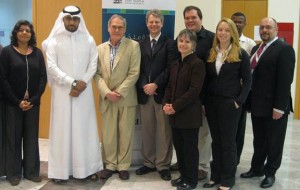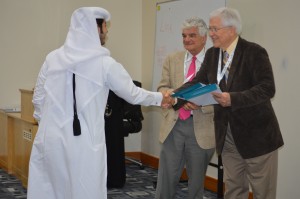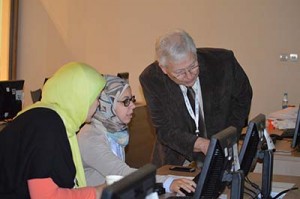Post developed by Katie Brown and Michael Traugott, with input from Ghaydaa Yehia Fahim Ali.
In 2008, Qatar University formed a partnership with the University of Michigan‘s Institute for Social Research (ISR) and Center for Political Studies (CPS) to develop a world-class public opinion research organization at Qatar University, the Social And Economic Survey Research Institute (SESRI). The partnership includes, among other activities, collaboration on organizational structure, recruitment and hiring, design of technical facilities, research, and analysis. As part of the cooperation, University of Michigan researchers also run training workshops in Qatar several times per year. Participants for the workshops come not only from Qatar University, but other private and public organizations from Qatar and throughout the Gulf region. Topics for the workshops have included research design, questionnaire design, cognitive interviewing, data analysis, and sampling. The workshops are structured as lectures, with group exercises integrated into the flow. Between days, participants complete thought exercises to spur discussion the next day.
This year, SESRI hosted three workshops. In the first workshop, which was delivered by ISR researchers Nancy Burns, Ted Brader, Kenneth Coleman, Allen Hicken, and Ashley Jardina, trainees were introduced to key SPSS concepts and notions of hypothesis design and formulation. Causal inferences and random sampling were key areas of discussion.
Michael Traugott of CPS and James Lepkowski of ISR’s Survey Research Center (SRC) traveled to Qatar to administer the second workshop, a course on sampling and weighting methods and techniques. Arriving Friday, the team took the weekend to adjust to the eight-hour time change and set up for the training. Monday through Thursday, sessions ran from 9:00 a.m. to 2:00 p.m., with a break in the middle for lunch and prayers.
Materials from sampling courses previously taught by Lepkowski were adapted with consideration of language and culture. Courses are taught in English with an Arabic translator on hand, while all materials are available in both languages. Technical terms associated with social science concepts and principles were provided in a glossary, in which some terms were accompanied by animations created by Rafael Nishimura to illustrate the ideas with video. Furthermore, all exercises were designed to be completed in Excel for reasons of accessibility. At the end of the course, Excel spreadsheets with key formulas were provided to all participants.
Traugott returned in May, along with Elizabeth Gerber, Ann Lin, and Monica Bhatt to facilitate a workshop on policy evaluation and spur debate on the purpose of evaluation in public policy, the primary components of policy and program evaluation, and methods of designing preliminary, defensible program evaluations. Workshop materials were tailored to ensure local relevance, including the identification of public policy issues in the cases of Qatar’s traffic woes and evaluations of changes to the education system in Qatar.
The workshop series has caught the attention of the Qatari press. The Qatar Tribune wrote that “The trainees who came from backgrounds in statistics and other diverse fields found the workshops to be useful in introducing them to concepts outside their direct frame of work.”
More than 100 beginner and intermediate-level researchers benefited from the workshops this year, which continue to grow in popularity. More information about the workshops can be found here.




